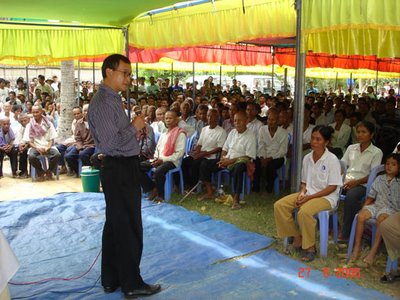 By Frank G. Anderson
By Frank G. Anderson
Column: Thai Traditions
Published: September 18, 2009
Nakhonratchasima, Thailand — Thailand’s Red Shirts and other supporters of former Prime Minister Thaksin Shinawatra on Saturday will commemorate the third anniversary of the military coup that deposed him, with a huge protest rally in Bangkok.
According to official sources, one of the objectives of the rally is to overthrow the Thai government and, according to Thai Prime Minister Abhisit Vejjajiva, to set up “a new state.”
This planned toppling of the Democrat-led government is hardly expected to occur, however, despite some uneasiness. There are far less than 50,000 protesters expected – but surprises have been known to take place in Thailand.
The Saturday rally coincides with a promise by various activist groups, including the Northeast People’s Network, to hold a protest vigil over what Thailand views as the loss of its ancient temple, Khao Phrea Vihear, to its historical rival, Cambodia. The temple sits on the border between the two countries but after a dispute in the International Court in The Hague, the court decided it belonged to Cambodia.
For its part, the Thai government has committed to reinstating the country’s Internal Security Act to ban protesters from the important Dusit district of Bangkok from Friday through Tuesday, Sept. 18-22, to cover the potentially troublesome timeframe. Dusit district, established by King Chulalongkorn, encompasses the country’s Parliament building as well as the royal palace.
Worried debates go back and forth in government offices, on street corners and in academic conference rooms. Will the Saturday commemoration fizzle out – much like the widely feared Y2K event did in 2000 – or blow up into a full-scale rebellion?
Some anti-Thaksin supporters are trying to fan the flames by suggesting that the former prime minister aims to topple the Thai monarchy.
This argument – that Thaksin is bent on overthrowing the monarchy – has been a favorite of militant and military pro-status quo forces in the country, in their concerted efforts to quell unrest and re-establish “domestic unity.” The accusation cannot be substantiated, though one side constantly repeats it and the other side repeatedly denies it.
Substantiation of rumors and false allegations has never been a major hurdle in the Land of Smiles, however, when it comes to dealing with historical and record-setting unrest and troublesome activists. It started with the nation’s political identity crisis after a 1932 coup, when a military junta, claiming to represent the people, converted the nation’s absolute monarchy to a constitutional monarchy.
Over the last decade activists in Thailand have becoming more and more active, intensified by the Sept. 19, 2006 coup that took down a democratically elected government. The legitimacy of that election process is open to question; it was challenged by accusations of widespread vote-buying and even more widespread “encouragement” to vote for a particular candidate.
In the Thai political process, both candidates and voters accept the idea that a candidate’s primary loyalty is to his party. This principle invariably weakens grassroots democracy, as it creates a reluctance to call elected officials to task on the one hand, and bottlenecks minority demands that their policies shift to benefit local interests.
Despite whatever occurs on or after Sept. 19, Thailand’s political and social future is likely to remain shrouded in rampant corruption, state-encouraged illusion and outright denial of civil and human rights to the majority of its people – many of whom, in fact, will attest that being deprived of human rights is the best thing for the country.
Militantly conservative traditionalists will cite the need to preserve and protect the monarchy, as well as what they have been taught to believe is the Thai way to resolve political strife – maintain tranquility, and use guns when that does not work. They do not seem to mind seeing their fellow Thais shot down in the streets or unjustly imprisoned. To them, activists who become too vocal are not only working against the interests of the country, but against the very Thai character itself. This rationale has, for a dozen and a half previous coups, proven disastrous for the nation.
Last but not least, this year’s protesters say they plan to make it clear that the country’s senior Privy Council adviser, retired General Prem Tinsulalonda, was behind the 2006 coup that ousted Thaksin. The veracity of the claim has gained ground over the last year or two, with many Thais openly “admitting” that Prem was behind the ouster of an arch enemy of the state, Thaksin.
Listening to ousted academic Giles Ungapakorn – safely ensconced in England after fleeing lese majeste charges in Thailand – one wonders just how far any Prem connection went. While Thaksin was still in power, an anonymous CD with startling photos and a narrative of Prem’s alleged misdoings was sent to members of the media. Wisely, no one dared publish the photos or the written material provided, which according to the anonymous donor were obtained by “modern day Japanese ninjas who broke into Prem’s Holy of Holies.”
State media is unashamedly working nonstop to quash any serious study of the issue, aided by strenuous denials.
--
(Frank G. Anderson is the Thailand representative of American Citizens Abroad. He was a U.S. Peace Corps volunteer to Thailand from 1965-67, working in community development. A freelance writer and founder of northeast Thailand's first local English language newspaper, the Korat Post – www.thekoratpost.com – he has spent over eight years in Thailand "embedded" with the local media. He has an MBA in information management and an associate degree in construction technology. ©Copyright Frank G. Anderson.)

 The trial has heard Duch (left) repeatedly accept responsibility and beg forgiveness for his role overseeing the torture and killing of over 15,000 as chief of Tuol Sleng prison. -- PHOTO: AFP
The trial has heard Duch (left) repeatedly accept responsibility and beg forgiveness for his role overseeing the torture and killing of over 15,000 as chief of Tuol Sleng prison. -- PHOTO: AFP












